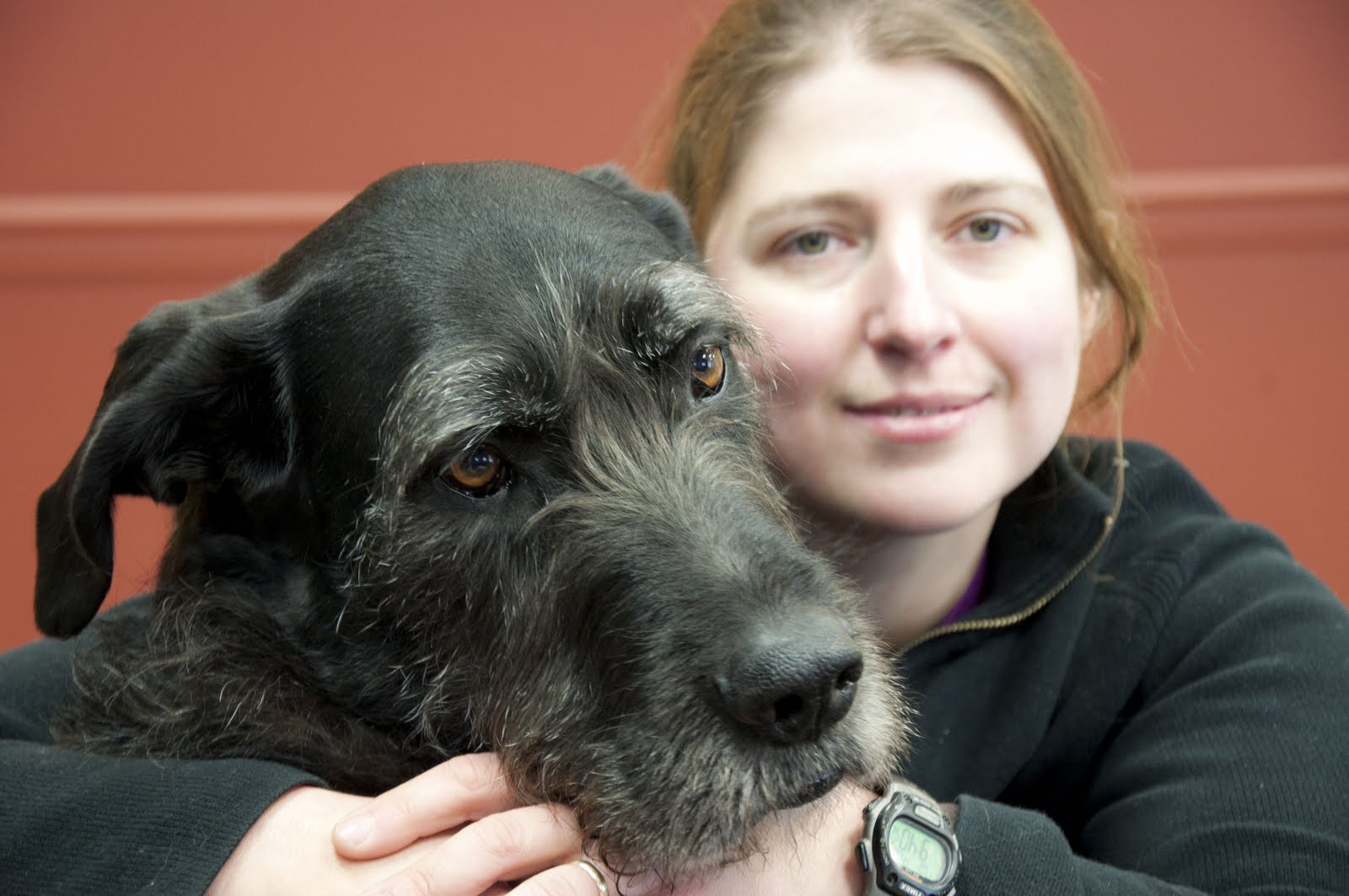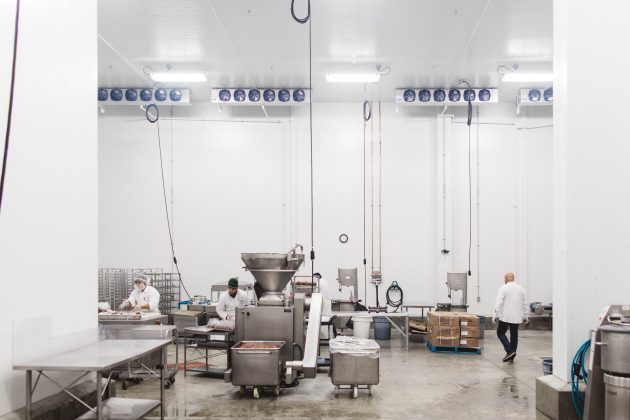
Raw revolution
By Mark Cardwell
Food Trends Pet Food British Columbia Editor pick Frozen pet food Raw pet food Red Dog Blue Kat Women in foodInna Shekhtman of Red Dog Blue Kat firmly believes raw food is the best for pets

Inna Shekhtman is a woman on a mission. Since 2004, the Vancouver-based pet food entrepreneur has been making and selling frozen raw dog and cat food and treats using human-grade meat.
However, with millions in new private funding and the hiring of a veterinarian, Shekhtman is now aiming to ramp up sales, enter new markets and shake up the Canadian pet food industry with her niche brand of sustainable fresh products, and an unshakeable faith in their ability to improve animal health and longevity.
“Variety is the spice of life,” said Shekhtman, co-founder and CEO of Red Dog Deli Raw Food. “However, variety is missing from regular pet food, which is highly processed. We’re here to provide pet owners with natural, healthy foods and give them the guidance and support they need to make a dietary transition that will allow their pets to live their best life and age gracefully.”
Services
Headquartered in Port Coquitlam, a 20-minute drive east of Vancouver, the company manufactures four products with around 50 varieties within those lines—from frozen complete meals and bones to treats and supplements—under the Red Dog Blue Kat label.
The company also offers a wide range of online complimentary services, including a portion calculator, feed guide and vet finder. It provides fee-based consultation services ranging from customized diet and lifestyle plans for pet owners new to raw food or those with pets with health challenges like food sensitivities or allergies.
Since August, those services are underpinned by Jules Mantler, an Australian-born veterinarian and animal nutritionist with 16 years of experience.
“Her role is to help pet parents transition to raw and better understand their pets, to formulate new products and review current formulations, do nutritional research and help with the development of new educational content,” said Shekhtman. “She is also working on connecting with other veterinarians who are open to fresh food diets and building a network that can support pet parents.”
Capital investment
The new hire comes on the heels of a strategic partnership that Red Dog Deli Raw Food inked in April with Forage Capital Partners, a $100-million Canadian growth equity fund that focuses on companies with disruptive products and business models in the agriculture and food industry value chains.
Under the terms of the deal, Calgary-based Forage and three pet-food industry experts—John Hart, Scott Doyle and Edmund O’Keefe—will provide $3.5 million in funding and professional assistance to help fuel and guide Shekhtman’s plans to expand her company’s paw print in the pet food industry.
“We’re proud to partner with the passionate team at Red Dog on their growth strategy,” Steven Leakos, one of Forage’s four partners, said when the partnership was announced. “Raw diets are a rapidly growing segment of the pet nutrition market in the North America (and) we’re excited by the opportunity to build on the momentum retailers are seeing in Canada through continued innovation in both product and package formats.”
For his part, American pet food executive and investor John Hart called Red Dog Deli “a highly differentiated, unique brand in the raw category,” and said he embraces Shekhtman’s vision and mission to provide better fresh nutrition solutions using high-quality, sustainably sourced ingredients.

Red Dog Blue Kat manufactures frozen raw dog and cat food and treats using human-grade meat. Photos courtesy Red Dog Blue Kat
The origin story
For 43-year-old Shekhtman, the partnership marks a new milestone in her decades-old quest to make a difference in the health and well-being of household pets by developing minimally processed whole foods based on animals’ ancestral nutritional needs.
That journey began in the late 1980s when Shekhtman’s entire family emigrated from Russia to Canada, settling in Edmonton. After graduating from the University of Alberta with a degree in computer science, she moved to Vancouver to work as a software engineer at MacDonald Dettwiler.
She brought the family dog, a retriever that soon died from an unexplained illness that caused severe inflammation.
“I felt very guilty,” recalled Shekhtman. “We tried surgery but it didn’t help. To this day I think the dry pet store kibble I fed her contributed to her illness.”
By then Shekhtman was volunteering at an animal shelter in Richmond, where she adopted a year-old Irish wolfhound bitch she named Adhara. She soon met a small group of women who were clients of vets who were proponents of raw food. “I used my research skills to learn about nutrition and the negative effects that processed foods can have on people and animals and the benefits from eating fresh foods,” said Shekhtman. “One day it all just clicked and everything made sense.”
In 2004, Shekhtman and a half-dozen people from the dog park made some test batches of raw food with a blender in a kitchen and fed them to their pets. “In just two weeks I saw incredible changes in Adhara,” said Shekhtman. “She reverted to being a puppy. Her energy level went through the roof, her poop got smaller and less smelly, and her teeth lost their tartar and become pearly white.”
Soon, Shekhtman, her husband Kevin Plimbley, two of the women from the group and another couple rented a warehouse, a meat grinder, fridge, freezer and other equipment needed to make enough raw food to feed their pets and to sell to other pet owners.
“It started out as a weekend gig, but it just started growing like crazy,” said Shekhtman. “We started making four or five formulas and selling them through stores and word of mouth.”
From the get go, the formulas of the fledging company the partners dubbed Red Dog (Blue Kat was added to the name years later when they started making cat food) were similar to what animals ate in the wild hundreds of years ago. Dog meals, for example, have one of a dozen different proteins including beef, chicken, turkey, lamb and buffalo, and contain 75 per cent muscle meat, organ and bone, and 25 per cent organic juiced vegetables.
Cat meals contain 98 per cent muscle meat, organ and bone, and two per cent organic juiced vegetables.
“Dogs and cats are biological creatures like us,” said Shekhtman. “Their cells require nutrition and their digestive system, like ours, is designed to process things that are simple and whole and haven’t been turned into something else and over-processed.”
From side hustle to full-time
Bitten by the entrepreneurial bug, Shekhtman quit her job and went at the raw pet food venture full time as sole owner.
With $10,000 of her own money, she set the company up first in a small facility on Mitchell Island in Richmond, then on the fourth floor of a Save On Meats manufacturing building on Hastings St. in an older area of Vancouver.
She spent five years there, selling some $700,000 worth of product a year through pet food stores.
After moving to two bigger locations in North Vancouver—the second a 7,000-sf facility plagued with major structural problems that drained her cash and caused endless headaches and heartaches for six years—Shekhtman relocated Red Dog Raw Deli to a new custom-made factory in Port Coquitlam in 2018.
“It helped us scale up and meet our growth goals,” she said. “In Year 1 there we hit our estimate for Year 3, which was $3 million.”
The new 12,000-sf building is HACCAP certified and equipped with cutting-edge meat industry equipment including two mixer grinders, a portioning machine, vacuum sealer and several freezers.
“We are 100 per cent frozen,” said Shekhtman. “We do tempering to go through the machinery, then the processing room where we mix, grind and package product before it goes into a blast freezer.”
Her company has two refrigerated trucks for deliveries in B.C.’s Lower Mainland region. Products bound for the Western provinces and Ontario are shipped via third-party reefer carriers.
According to Shekhtman, the company is now doing more than $4 million in sales. Their customer base includes 6,000 pets, roughly 70 per cent of them are dogs. “Cats represent only 30 per cent, but their numbers are growing fast,” said Shekhtman. “That’s understandable because cats benefit more from raw food than dogs.”
Her goal now, she added, is continue producing top-quality raw food and helping people learn about and transition to raw food like she did.
“We offer a holistic diet that is designed for dogs and cats at the different stages of their lives,” said Shekhtman. “You can’t just continue to give the same processed stuff that is neither natural nor healthy to your pets all the time. That’s what the regular pet food industry is all about. But we believe that raw is where’s it at.”
Print this page